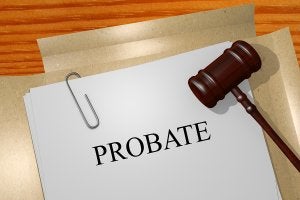-
Reasons Your Attorney May Suggest a Probate Bond
A probate bond is much like an insurance policy that protects the beneficiaries of an estate from acts of wrongdoing. If an estate or an executor is required to obtain a probate bond in The Woodlands, the issuer of the bond agrees to compensate the beneficiaries if a financial loss results from errors committed by the executor. The process of obtaining a probate bond can be complicated, but there are several reasons why your probate lawyer may recommend that you obtain one.

You would like to give your beneficiaries peace of mind
The process of obtaining a probate bond can be long and arduous, and the premiums can be prohibitively expensive. For these reasons, many testators choose to waive the bond requirement. But in some cases, requiring a probate bond is a wise move because it can grant peace of mind to your beneficiaries as well as to the executor over the estate. With a probate bond, heirs can rest assured that they will receive the assets to which they are entitled under the terms of your will. You may also enjoy peace of mind knowing that your heirs will be properly taken care of after you have passed on.
Your chosen executor is also an heir
A conflict of interest can arise when a designated executor is expected to receive an inheritance. Even if you trust your executor to faithfully carry out the duties required of him or her, the other beneficiaries may not necessarily be quite as trusting. Oftentimes, requiring a probate bond can help preserve harmony within the family.
The estate holds substantial assets
Probate courts are more likely to require that a bond be obtained if the estate holds significant assets. When greater financial gain is at stake, the possibility of fraudulent activity tends to increase. Additionally, a significant estate may lend itself to a greater chance of making unintentional errors that may cost your beneficiaries part of their inheritance.
You expect to leave unsecured debts behind
Unsecured debts are those that are not attached to collateral. These include credit card bills or medical debts. If there is a possibility that you will leave substantial unsecured debts when you pass on, requiring a probate bond can be a smart decision.
-
What Happens to Stocks When the Owner Is Deceased?
It is likely that the stocks of a deceased owner will have to go through the probate process, but it’s best to consult a probate lawyer in Houston to confirm this. If stocks are jointly owned or titled “transfer on death,” then the designated survivor can simply redeem the stocks without the need for formal probate. Otherwise, the executor of the will must file the will with the court and then receive court-issued letters testamentary to validate his or her authority to transfer ownership of stock shares.
Oftentimes, the executor of the will then set up a separate estate account and re-register the stocks in the name of the estate itself, rather than the decedent. If the will specifies that the stocks are to go to one or more specific beneficiaries, the stocks can usually be transferred to those individuals unless the assets must otherwise be used to satisfy the liabilities of the estate. In some cases, the executor may need to obtain a court order to use the stocks in this manner. Otherwise, the stocks can simply be liquidated and the funds deposited into the estate account.

-
Probate Bonds 101
Many people involved with an estate go through the probate process without the need to secure a probate bond . If a family in The Woodlands does need a probate bond, then the probate lawyer can provide legal guidance in this area. A probate bond, also referred to as a fiduciary bond, and is simply a way to protect the estate from fraudulent or incompetent acts.
Understanding Probate Bonds

When a probate bond is required, the executor of the estate must post the bond. The executor is the person responsible for identifying the beneficiaries, satisfying any claims against the estate, and distributing the estate in accordance with the decedent’s will. Unfortunately, it is not unheard of for executors to engage in fraudulent acts for their own gain or simply to manager or administer the estate in an incompetent fashion. Probate bonds therefore provide an added measure of protection for the estate and the beneficiaries.
Recognizing When Probate Bonds Are Needed
Probate bonds are not always necessary, but executors may be required to post them when the estate is affected by unsecured debts. By posting a fiduciary bond, the executor is ensuring that these unsecured debts will be satisfied from the assets of the estate. If the will has not designated a specific executor, then a probate bond may be required in order to protect the beneficiaries. In some cases, the will may specify that the executor is required to post a bond. In other cases, the court may require that the executor post a bond. This may occur in cases when the estate involves substantial assets. Lastly, a probate bond may be required if one or more of the heirs named in the will refuse to provide consent to waive the bond requirement.
Identifying the Executor’s Fiduciary Duties
The fiduciary duty of the executor is to the beneficiaries. Subject to the probate court’s supervision, the executor is responsible for keeping the assets of the estate completely separate from his or her own assets. The executor must keep careful, accurate records of all matters pertaining to the assets of the estate. Those records must be made available to the beneficiaries upon request. If the executor carries out his or her fiduciary duties competently and does not engage in fraudulent acts, then the amount of the probate bond will be returned to him or her when the estate is settled.
-
What to Know About a Probate Bond
When an individual goes to a probate lawyer to have a will drafted, the document will almost certainly waive the requirement of a probate bond . But in some cases, it is a requirement to obtain a probate bond in The Woodlands unless your probate lawyer successfully argues against it. When a probate bond is issued, its purpose is to offer protection to the heirs and creditors of the decedent specifically from the negligent or intentionally wrongful acts of the executor or administrator.
For example, an executor might decide to retain all of the funds in an estate for him- or herself instead of distributing them among the creditors and other heirs. The existence of a probate bond allows the creditors and heirs to recover the amounts they are entitled to despite this act of malfeasance. Although a probate bond seems to be desirable, in most situations it actually creates more problems than it solves. This is because obtaining a substantial probate bond can be costly and not everyone will be qualified to do so. The funds from the estate cannot be used to pay for the probate bond simply because these funds are inaccessible until the bond is already obtained.

RECENT POSTS
categories
- Uncategorized
- Estate Planning
- Probate
- Family Law
- Drafting a Will
- Divorce Lawyer
- Texas Family Law
- Divorce
- Real Estate
- Probate Court
- Child Custody
- Andrew J. Bolton
- Esq.
- Adoption
- Law Office of Andrew J. Bolton
- Wills
- Executor
- Infographic
- Guardianship
- Trusts
- Contested Divorce
- Child Support
- Attorney
- Living Wills
- Contested Will
- Prenuptial
- Probate Bond
- Heir Apparent
- Legacy Contact
- Living Trusts
- legal guardian
- Legal Disputes
- property rules
- Common Law
- Stocks
- Estate Tax
